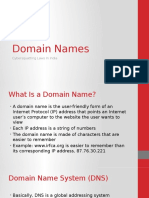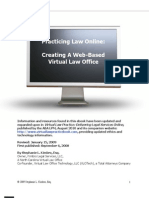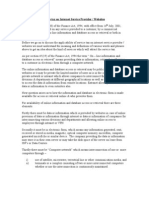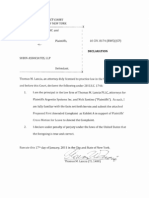7925-2005-Bir Ruling No. 009-05
7925-2005-Bir Ruling No. 009-05
Uploaded by
Alexander Julio ValeraCopyright:
Available Formats
7925-2005-Bir Ruling No. 009-05
7925-2005-Bir Ruling No. 009-05
Uploaded by
Alexander Julio ValeraOriginal Description:
Original Title
Copyright
Available Formats
Share this document
Did you find this document useful?
Is this content inappropriate?
Copyright:
Available Formats
7925-2005-Bir Ruling No. 009-05
7925-2005-Bir Ruling No. 009-05
Uploaded by
Alexander Julio ValeraCopyright:
Available Formats
August 2, 2005
BIR RULING NO. 009-05
Sec. 23 (F) 000-00
The Law Firm of Raymundo A. Armovit
Suite 803, The Centerpoint
Julia Vargas Corner Garnett Streets
Ortigas Center, Pasig City
Attention: Atty. Miguel R. Armovit
Gentlemen :
This refers to your letter dated October 18, 2001 stating that:
1. Dot Phone, Inc. (DPI) is a corporation registered under the laws of the British
Virgin Islands as a domain name service company for Philippine (PH)
domain names;
2. DPI is engaged in the business of performing PH domain name services
outside of the Philippines for PH domain name holders located inside of,
as well as outside of the Philippines, through PH domain name
servers/web servers also located outside of the Philippines;
3. Domain Merchandising Services, Inc. (DMSI) is a corporation duly organized
and
existing under and by virtue of the laws of the Republic of the Philippines; SIcEHD
4. DMSI is engaged in the business of collecting PH domain name service fees in
the Philippines as agent for and in behalf of DPI from resellers located
outside of the Philippines who in turn collect PH domain name service fees
from PH domain name holders located inside of, as well as outside of the
Philippines, for domain name services performed outside of the
Philippines by DPI;
5. DPI has contracted outside of the Philippines with various resellers located
inside of, as well as outside of the Philippines for the latter to offer for sale
PH domain name services to be performed by DPI outside of the
Philippines for potential PH domain name holders located inside of, as well
as outside of the Philippines;
6. PH domain name service fees for PH domain name services performed by DPI
outside of the Philippines for PH domain name holders located inside of,
as well as outside of the Philippines, are collected in this manner:
a. PH domain name holders located inside of, as well as outside of the
Philippines pay PH domain name service fees directly to the various
resellers located inside of, as well as outside of the Philippines who,
in turn, either directly or indirectly remit the same PH domain name
service fees to DPI through DMSI in the Philippines by telegraphic
transfers, online credit card payments or check issuances; and TDCAHE
b. In instances where PH domain name service fees are coursed through
CD Technologies Asia, Inc. © 2016 cdasiaonline.com
DMSI in the Philippines, the latter issues its own duly registered
official receipts of payments in the name of the resellers concerned,
specifically indicating therein that such official receipts are merely
issued for the account of DPI, the ultimate recipient of the PH
domain name service fees.
7. Every computer on the Internet has a unique address called an IP (Internet
Protocol) address. An IP address is a set of four three-digit numbers
separated by dots (e.g., 123.456.789.012). One can actually input the IP
address in a web browser such as Netscape or Internet Explorer and be
transported to a website. However, given that IP addresses are difficult to
remember, the designers of the Internet decided to come up with a short-
cut in the form of domain names (e.g., bir.gov.ph). A domain name is
actually associated with a unique IP address so that if an e-mail is
addressed to a particular domain name, the Internet servers look at a
"virtual directory" that links it to an IP address. For example, if an e-mail is
addressed to bir.gov.ph, the Internet server looks at a "virtual directory"
that reveals that the IP address for bir.gov.ph is 123.456.789.012 — the
message is then sent to that IP address. A domain name service company
therefore, such as the DPI, is tasked with the maintenance, updating and
operation of the "virtual directory."
8. DPI, as a domain name service company, acts as an interface between a
domain name and a domain name registry, is responsible for providing
registration and other value-added services, or from the standpoint of its
customers, performs the functions of a "Registrar" or one who performs
the following services: (a) registration function — collects the registration
information from the customer and creates an entry in the "virtual
directory" in behalf of the customer; and (b) maintenance of "virtual
directory" — ensures that the "virtual directory" operates continuously so
that all messages intended for a certain domain name are sent to the
correct computer on the Internet.
You now request for a ruling confirming your opinion on the following issues:
a) DPI, as a domain name service company, is engaged in the sale of services, not
goods; ITcCaS
b) DPI, as a non-resident foreign corporation, particularly a domain name service
company performing domain name services outside of the Philippines for
domain name holders located inside of, as well as outside of the
Philippines, is not subject to Philippine taxation on fees collected in the
Philippines for such services performed outside of the Philippines; and
c) DMSI, the Philippine collecting agent of DPI is likewise not subject to
Philippine taxation on fees collected by such agent in the Philippines,
considering that such fees are merely collected by such agent for and in
behalf of DPI to be ultimately delivered to the latter.
In reply, please be informed as follows:
1. DPI, as a domain name service company is engaged in the sale of services, not
goods.
In order to determine whether a certain transaction is a service transaction or a
property transaction, it is imperative that a characterization of the same shall be made.
A distinction between transactions in goods and transactions in services is important
CD Technologies Asia, Inc. © 2016 cdasiaonline.com
for purposes of characterization of the revenue/income derived from a particular
transaction.
The basic distinction between a transaction in goods versus a transaction in
services is whether the customer acquires property from the provider. Implicit in the
concept of services income is the notion that the value conferred on the purchaser
does not take the form of a cognizable property interest. Therefore, generally speaking,
if the seller transfers possession of property rights to the purchaser, the transaction
should be characterized as a transfer of property rather than the provision of a service.
On the other hand, if the customer does not receive an interest in property, then the
revenue should be characterized as revenue or income from services. (Taylor S. Reid,
ESQ., Tax Characterization of Electronic Commerce Revenue, E-Commerce Tax Report ,
Vol. 1, No. 5, BNA Tax, 2000) HDAaIS
Thus, when a customer receives property in connection with the rendition of
services by the vendor, it will often be necessary to determine whether the income from
the transaction should be characterized as services income or income from the sale of
goods. If the customer owns the property after the transaction, but bene cial
ownership of the property was not transferred from the vendor to the customer, then
the transaction generally should be treated as a services transaction. For example, if
the customer engages the vendor to create an item of property that the customer will
own from the moment of its creation, then no property will have been transferred from
the vendor to the customer, and the transaction should be characterized as the
provision of services (Boulez v. Commissioner, 83 T.C. 584 (1984).
In this regard and since DPI, being a domain name service company, merely
renders administrative functions that do not involve any transfer of technology,
equipment or property to its subscribers, nor does its rendition of services to its
subscribers effectively transfer ownership of the technology it used in the transaction,
DPI, therefore, is classified to be engaged in the sale of services, not of goods.
If, however, the customer receives a valuable report or other property that was
not created speci cally for that customer, then the transaction could give rise to
income from the sale of goods. (Taylor S. Reid, ESQ., Tax Characterization of Electronic
Commerce Revenue, E-Commerce Tax Report, Vol. 1, No. 5, BNA Tax, 2000)
2. DPI as a non-resident foreign corporation, particularly a domain name service
company performing domain name services outside of the Philippines for
domain name holders located inside of, as well as outside of the Philippines, is
not subject to Philippine taxation on fees collected in the Philippines for such
services performed outside of the Philippines by DPI.
DPI is a corporation registered under the laws of the British Virgin Islands, and
not being registered to do business in the Philippines, it is, therefore, classi ed for
purposes of Philippine taxation as a non-resident foreign corporation, or a foreign
corporation not engaged in trade or business in the Philippines. Pursuant to Section 23
(F) of the Tax Code of 1997, a foreign corporation, whether or not engaged in trade or
business in the Philippines, is taxable only on income derived from sources within the
Philippines. Conversely, income derived by such non-resident foreign corporation from
sources outside of the Philippines is not taxable under Philippine laws.
The rule in this jurisdiction regarding tax situs is that the source of income is the
property, activity or service that produced the income; the test of taxability is the
"source" and the source of income is that activity which produced the income ( CIR v.
British Overseas Airways Corporation, G.R. Nos. 65773-74, April 30, 1987). With regard
to compensation for labor or personal services, services performed within the
CD Technologies Asia, Inc. © 2016 cdasiaonline.com
Philippines, regardless of the residence of the payor, or of the place in which the
contract for services was made, or of the place of payment, is gross income from
sources within the Philippines (Section 155, Revenue Regulations No. 2). Stated
differently, the situs of the income derived from labor or personal services is
determined solely by the place where service is rendered (CIR v. Japan Air Lines, Inc .,
G.R. No. 60714, October 4, 1991). Compensation from services performed abroad is
considered income from sources without the Philippines. (BIR Ruling No. 464-93 dated
November 19, 1993) ADETca
In this particular case, the sources of DPI's income are the contracts between
DPI and the various resellers. Under these contracts, DPI has contracted outside of the
Philippines with various resellers located inside, as well as outside, of the Philippines
for the latter to offer for sale PH domain name services to be performed by DPI outside
of the Philippines for potential PH domain name holders located inside, as well as
outside, of the Philippines. Considering that the services that produce the income (i.e.,
registration and maintenance of PH domain names) are performed outside of the
Philippines, it follows that the income derived from the performance of such services is
not taxable in the Philippines.
3. DMSI, the Philippine collecting agent of DPI is likewise not subject to Philippine
taxation on fees collected by such agent in the Philippines, considering that such
fees are merely collected by such agent for and in behalf of DPI and to be
ultimately delivered to the latter.
Gross receipts subject to tax under the Tax Code do not include monies or
receipts entrusted to the taxpayer which do not belong to them and do not redound to
the taxpayer's bene t; and it is not necessary that there must be a law or regulation
which would exempt such monies and receipts within the meaning of gross receipts
under the Tax Code. (CIR v. Tours Specialists, Inc., G.R. No. 66416, March 21, 1990)
The PH domain name service fees collected in the Philippines by DMSI as agent
for and in behalf of DPI, therefore, do not constitute income of DMSI and are, in ne, not
subject to any form of Philippine taxation. However, the gross commission earned by
DMSI from said services is subject to the regular corporate income tax at the rate of
thirty-two percent (32%) pursuant to Section 27 (A) of the Tax Code of 1997. Moreover,
the services rendered by DMSI is subject to the ten percent (10%) value-added tax
imposed under Section 108 of the same Code. Furthermore, DMSI shall maintain a
separate book of accounts, and shall not issue its own of cial receipts, for the service
fees it collects for and in behalf of DPI.
This ruling is being issued on the basis of the foregoing facts as represented.
However, if upon investigation, it will be disclosed that the facts are different, then this
ruling shall be considered null and void.CaHAcT
Very truly yours,
(SGD.) JOSE MARIO C. BUÑAG
OIC, Commissioner of Internal Revenue
CD Technologies Asia, Inc. © 2016 cdasiaonline.com
You might also like
- BIR Ruling 009-05 - Taxability of Domain Name Service Company Performing Domain Name Services Outside PHDocument6 pagesBIR Ruling 009-05 - Taxability of Domain Name Service Company Performing Domain Name Services Outside PHJerwin Dave0% (1)
- Cisco AgreementDocument29 pagesCisco AgreementAfif Al FattahNo ratings yet
- BIR - Ruling - DA - C-148 - 406-09 - Collection On Behalf of NRFC Not Subject To WHTDocument6 pagesBIR - Ruling - DA - C-148 - 406-09 - Collection On Behalf of NRFC Not Subject To WHTjohn allen MarillaNo ratings yet
- 05.06 Friend or Foe, Mexico US History BVSDocument2 pages05.06 Friend or Foe, Mexico US History BVSPalmRock ProductionsNo ratings yet
- BIR RUling No. 009-05Document6 pagesBIR RUling No. 009-05Jocel Isidro Dilag100% (1)
- Domain Names: Cybersquatting Laws in IndiaDocument18 pagesDomain Names: Cybersquatting Laws in IndiaUpasna HandaNo ratings yet
- Client Handbook Incorporation/Registration of A DIFC Entity Limited Liability Company (LLC)Document12 pagesClient Handbook Incorporation/Registration of A DIFC Entity Limited Liability Company (LLC)Zviagin & CoNo ratings yet
- Domain Registration and Hosting of A Website: The Ways and MeansDocument9 pagesDomain Registration and Hosting of A Website: The Ways and MeansSougata ChattopadhyayNo ratings yet
- Itad Bir Ruling No. 191-15 Uk VatDocument8 pagesItad Bir Ruling No. 191-15 Uk VatKarla TigaronitaNo ratings yet
- Final ACYFAR4 - Critique PaperDocument39 pagesFinal ACYFAR4 - Critique PaperDianne Reign GalangNo ratings yet
- Assinment The Concept of Domain Name Disputes With Specific Reference To Remedies Against Infringement of Trade MarksDocument18 pagesAssinment The Concept of Domain Name Disputes With Specific Reference To Remedies Against Infringement of Trade Markskomalvjain21No ratings yet
- India: The Realm of Domain Names: An Indian PerspectiveDocument6 pagesIndia: The Realm of Domain Names: An Indian PerspectiverickywilliamNo ratings yet
- Revenue Memorandum Circular No. 078-18Document6 pagesRevenue Memorandum Circular No. 078-18JoyceMendozaNo ratings yet
- FARHO3Document2 pagesFARHO3yeshaguzman0No ratings yet
- Indian Cases WipoDocument7 pagesIndian Cases WipoLEX-57 the lex engineNo ratings yet
- 2009OpinionNo09 12Document4 pages2009OpinionNo09 12owenNo ratings yet
- Everything You Need To Know About Domain Name RegistrationDocument12 pagesEverything You Need To Know About Domain Name Registrationyashubhatt21No ratings yet
- WFH Demo AgreementDocument6 pagesWFH Demo AgreementsreedharkundirNo ratings yet
- Intellectual Property in Digital EraDocument11 pagesIntellectual Property in Digital Eramarcus BlackburnNo ratings yet
- VoIP Office Presentation-Ilovepdf-Compressed PDFDocument14 pagesVoIP Office Presentation-Ilovepdf-Compressed PDFAnoyNo ratings yet
- Communicate Freely!: One Simple Solution For All Your Communication NeedsDocument14 pagesCommunicate Freely!: One Simple Solution For All Your Communication NeedsAnoyNo ratings yet
- Check List For IncorporationDocument2 pagesCheck List For IncorporationAnjaneya YadlapalliNo ratings yet
- Cybersquatting IPRDocument6 pagesCybersquatting IPRHarsh VardhanNo ratings yet
- DOF Reconsideration - Request - For - License Fees Are RoyaltiesDocument11 pagesDOF Reconsideration - Request - For - License Fees Are RoyaltiesJohnallen MarillaNo ratings yet
- Sony Computer Entertainment HK 2017-Re - Foreign - Corporation - Doing - BusinessDocument9 pagesSony Computer Entertainment HK 2017-Re - Foreign - Corporation - Doing - BusinessWinter SNo ratings yet
- Gontiñas 3 PDFDocument13 pagesGontiñas 3 PDFKandee Marie ApiNo ratings yet
- KNS - Franchisee AgreementDocument16 pagesKNS - Franchisee AgreementKrishna KnsNo ratings yet
- Execution of Rentit1 (Rental Application)Document6 pagesExecution of Rentit1 (Rental Application)Namana KhareNo ratings yet
- Guide To Registering A Nigerian Domain: DisclaimerDocument11 pagesGuide To Registering A Nigerian Domain: DisclaimerAdetayo AdegbemleNo ratings yet
- Bir Ruling No. 165-99Document5 pagesBir Ruling No. 165-99drei.jimenezNo ratings yet
- Satyam Infoway LTD Vs Sifynet Solutions PVT LTD - Tulika BoseDocument5 pagesSatyam Infoway LTD Vs Sifynet Solutions PVT LTD - Tulika BoseTulika BoseNo ratings yet
- Satyam Infoway LTD Vs Siffynet Solutions Pvt. LTD On 6 May, 2004Document10 pagesSatyam Infoway LTD Vs Siffynet Solutions Pvt. LTD On 6 May, 2004HEMASHEKHARNo ratings yet
- Lincoln BrochureDocument10 pagesLincoln BrochureKyaw SithuNo ratings yet
- D N C S: Omain AME EaningDocument5 pagesD N C S: Omain AME EaningAVNISH PRAKASHNo ratings yet
- Synopsis of Identify Several Problems Associated With The Setup and Operation An E-Commerce Website?Document5 pagesSynopsis of Identify Several Problems Associated With The Setup and Operation An E-Commerce Website?Niranjan DikshitNo ratings yet
- Law and TechnologyDocument22 pagesLaw and TechnologyWorkaholicNo ratings yet
- IP Litigation On The InternetDocument26 pagesIP Litigation On The InternetGiridhar PillarisettiNo ratings yet
- Suggested Minimum Requirements For Law Firms Delivering Legal Services Online. BackgroundDocument3 pagesSuggested Minimum Requirements For Law Firms Delivering Legal Services Online. BackgroundTriton007No ratings yet
- Proposed Retained AgreementDocument6 pagesProposed Retained AgreementJhon Allain Hisola100% (2)
- Engagement Proposal - MegawideDocument3 pagesEngagement Proposal - Megawideianlayno71No ratings yet
- TyposquattingDocument3 pagesTyposquatting1983070No ratings yet
- How To Start An Internet Service Provider BusinessDocument20 pagesHow To Start An Internet Service Provider BusinessDigital AmeerNo ratings yet
- 2024 New CMS Master AgreementDocument3 pages2024 New CMS Master Agreementcharisma.tripulcaNo ratings yet
- Cisco Partner AggrementDocument28 pagesCisco Partner AggrementAfif Al FattahNo ratings yet
- Esign YD08511Document45 pagesEsign YD08511Debojyoti NandiNo ratings yet
- Practicing Law Online: Creating A Web-Based Virtual Law OfficeDocument51 pagesPracticing Law Online: Creating A Web-Based Virtual Law OfficeStephanie L. Kimbro100% (1)
- Indirect Channel Partner Agreement - ROW Aug 2019 Confidential Information Page 1 of 28Document28 pagesIndirect Channel Partner Agreement - ROW Aug 2019 Confidential Information Page 1 of 28Rifki NugrahaNo ratings yet
- Kansai Nerolac Software TDSDocument17 pagesKansai Nerolac Software TDSkumargaurav21281No ratings yet
- Applicability of ST On ISPDocument3 pagesApplicability of ST On ISPapi-3822396No ratings yet
- Step-By-Step Procedure For Sole Business PropietorshipDocument3 pagesStep-By-Step Procedure For Sole Business PropietorshipAbigaile PaulinoNo ratings yet
- RA No 11967 X IRR Matrix.24.05.27.001.KTSDocument34 pagesRA No 11967 X IRR Matrix.24.05.27.001.KTSKarlaSantosNo ratings yet
- Hazel 3 PDFDocument13 pagesHazel 3 PDFKandee Marie ApiNo ratings yet
- Soft Copy of Agent Registration FormDocument4 pagesSoft Copy of Agent Registration FormOrnguga Kenneth TerseeeNo ratings yet
- Subin Associates New York Defendants - Plaintiff DeclarationDocument28 pagesSubin Associates New York Defendants - Plaintiff DeclarationSubin AssociatesNo ratings yet
- Partner AgreementDocument11 pagesPartner AgreementagussmarufNo ratings yet
- Chapter 11. Foreign CompanyDocument7 pagesChapter 11. Foreign Companyknownperson045No ratings yet
- Taxation Law AssignmentDocument8 pagesTaxation Law AssignmentPallavi SharmaNo ratings yet
- Checklist of Requirements - Job Order LandbasedDocument1 pageChecklist of Requirements - Job Order LandbasedClark InternationalNo ratings yet
- Ra 11453 - Signed Irr of AfabDocument72 pagesRa 11453 - Signed Irr of Afabjgorecho.arthalandNo ratings yet
- Overview of Some Voice Over IP Calls and SMS Verifications Services ProvidersFrom EverandOverview of Some Voice Over IP Calls and SMS Verifications Services ProvidersNo ratings yet
- Enforcement and Investor Protection DepartmentDocument5 pagesEnforcement and Investor Protection DepartmentAlexander Julio ValeraNo ratings yet
- PNP Form 6-B4 - Special Permit To Purchase and Move Controlled ChemicalsDocument2 pagesPNP Form 6-B4 - Special Permit To Purchase and Move Controlled ChemicalsAlexander Julio Valera60% (5)
- FM-CSVlrd-03 P License Rev 0 April 30 2018 02AUG2018Document2 pagesFM-CSVlrd-03 P License Rev 0 April 30 2018 02AUG2018Alexander Julio Valera50% (2)
- RR No. 6-2019 - IRR Estate Tax AmnestyDocument5 pagesRR No. 6-2019 - IRR Estate Tax AmnestyAlexander Julio ValeraNo ratings yet
- Joint AffidavitDocument1 pageJoint AffidavitAlexander Julio ValeraNo ratings yet
- Court of Tax Appeals: PhilipDocument31 pagesCourt of Tax Appeals: PhilipAlexander Julio ValeraNo ratings yet
- Pns Bafps 49 2011 Code of PhilgapDocument27 pagesPns Bafps 49 2011 Code of PhilgapAlexander Julio ValeraNo ratings yet
- Republic of The Philippines National Capital Judicial Region Regional Trial Court Branch 101, ManilaDocument7 pagesRepublic of The Philippines National Capital Judicial Region Regional Trial Court Branch 101, ManilaAlexander Julio ValeraNo ratings yet
- Enforcement and Investor Protection DepartmentDocument3 pagesEnforcement and Investor Protection DepartmentAlexander Julio ValeraNo ratings yet
- Annex 1 Dlac Office DutyDocument14 pagesAnnex 1 Dlac Office DutyAlexander Julio ValeraNo ratings yet
- Judicial Affidavit: Regional Trial CourtDocument7 pagesJudicial Affidavit: Regional Trial CourtAlexander Julio ValeraNo ratings yet
- CableDocument22 pagesCableAlexander Julio ValeraNo ratings yet
- Salvador P. Malbarosa, Petitioner, vs. Hon. Court of Appeals and S.E.A. Development CORP. RespondentsDocument6 pagesSalvador P. Malbarosa, Petitioner, vs. Hon. Court of Appeals and S.E.A. Development CORP. RespondentsAlexander Julio ValeraNo ratings yet
- Villaroel V EstradaDocument2 pagesVillaroel V EstradaAlexander Julio ValeraNo ratings yet
- Iron FileDocument1 pageIron FileAlexander Julio ValeraNo ratings yet
- 2nd CaseDocument18 pages2nd CaseAlexander Julio ValeraNo ratings yet
- Hird Division G.R. No. 214054, August 05, 2015 NG MENG TAM, Petitioner, v. CHINA BANKING CORPORATION, Respondent. Decision Villarama, JR., J.Document4 pagesHird Division G.R. No. 214054, August 05, 2015 NG MENG TAM, Petitioner, v. CHINA BANKING CORPORATION, Respondent. Decision Villarama, JR., J.Alexander Julio ValeraNo ratings yet
- COMM NewlifeDocument8 pagesCOMM NewlifeAlexander Julio ValeraNo ratings yet
- Torres v. JavierDocument10 pagesTorres v. JavierChristie Joy BuctonNo ratings yet
- Mobile ChannelDocument2 pagesMobile Channelchintan9970No ratings yet
- Monthly Report of Ship Auction Market April 2024Document2 pagesMonthly Report of Ship Auction Market April 2024ChetanNo ratings yet
- Approach - Answer:: ABHYAAS TEST 3 - 2033 (2021)Document25 pagesApproach - Answer:: ABHYAAS TEST 3 - 2033 (2021)Harika NelliNo ratings yet
- The PSychological Foundations of Culture - Mark SchallerDocument0 pagesThe PSychological Foundations of Culture - Mark Schallersuperilean100% (1)
- Smt. Chandibai Himathmal Mansukhani College Smt. Chandibai Himathmal Mansukhani CollegeDocument83 pagesSmt. Chandibai Himathmal Mansukhani College Smt. Chandibai Himathmal Mansukhani CollegeKello HikfNo ratings yet
- 626351Document293 pages626351Jaciel PereiraNo ratings yet
- GP Pro Ex 27 ManualDocument3 pagesGP Pro Ex 27 ManualCarolinaNo ratings yet
- Financial Markets and Institutions248 ut9g7tDEPEDocument2 pagesFinancial Markets and Institutions248 ut9g7tDEPEKhushi SangoiNo ratings yet
- History of TranslationDocument2 pagesHistory of TranslationEazl VargasNo ratings yet
- Child Abuse and Child Labor FinalDocument56 pagesChild Abuse and Child Labor FinalchelseapasiahNo ratings yet
- Report of A Joint Mission: Mozambique, 10-17 December 2019Document22 pagesReport of A Joint Mission: Mozambique, 10-17 December 2019Mark Anthony MadridanoNo ratings yet
- Proceedings of The Boston Area Colloquium in Ancient Philosophy, Vol. XXIDocument320 pagesProceedings of The Boston Area Colloquium in Ancient Philosophy, Vol. XXImelihontes100% (1)
- A Historical, Sociopolitical, and Bioethicla Look at The Healing KnifeDocument10 pagesA Historical, Sociopolitical, and Bioethicla Look at The Healing KnifedrisaaccseligsonNo ratings yet
- Yds Sinonimler KelimelerDocument6 pagesYds Sinonimler KelimelerMahir HamdiyevNo ratings yet
- Protection of Plant Varieties and Farmers' Rights ActDocument22 pagesProtection of Plant Varieties and Farmers' Rights Actratna supriyaNo ratings yet
- Cognizant On-Campus Hiring 2025 - Eligible For In-Person Technical InterviewDocument2 pagesCognizant On-Campus Hiring 2025 - Eligible For In-Person Technical Interviewetikelavaishnavi09No ratings yet
- Company Overview: Frequetly Asked QuestionsDocument6 pagesCompany Overview: Frequetly Asked Questionsapi-355166595No ratings yet
- PranDocument10 pagesPranAsif FaiyedNo ratings yet
- Public Goods and Common Resources The Different Kinds of GoodsDocument5 pagesPublic Goods and Common Resources The Different Kinds of GoodsTiffanyUyNo ratings yet
- 09.22.21 51J-5 Re Brady Exculpatory Evidence in The Possession of Edgardo Ramos and The USAODocument10 pages09.22.21 51J-5 Re Brady Exculpatory Evidence in The Possession of Edgardo Ramos and The USAOThomas WareNo ratings yet
- Cluster Housing and Planned Unit Development PudDocument71 pagesCluster Housing and Planned Unit Development PudRoi KimssiNo ratings yet
- Planning 2 PresentationDocument2 pagesPlanning 2 Presentationdapilin.rashid.hNo ratings yet
- HBL at Work DataDocument25 pagesHBL at Work DataRana Muhammad TalhaNo ratings yet
- Trade Union Act ComparisonDocument2 pagesTrade Union Act ComparisonBernewsAdminNo ratings yet
- Operator Guide SS34 PDFDocument30 pagesOperator Guide SS34 PDFGilbert Kamanzi100% (1)
- Lozana vs. Depakakibo GR No. L-13680, April 27, 1960Document2 pagesLozana vs. Depakakibo GR No. L-13680, April 27, 1960SHARIEF ABBAS ABANTAS0% (1)
- Enhancing Performance of Mwasalat Misr Company in GreaterDocument16 pagesEnhancing Performance of Mwasalat Misr Company in GreaterAmany HamdyNo ratings yet
- Psalms, Hymns, and Spiritual So - WILLIAM D. BARRICKDocument6 pagesPsalms, Hymns, and Spiritual So - WILLIAM D. BARRICKPedro Alejandro AcuñaNo ratings yet











































































































